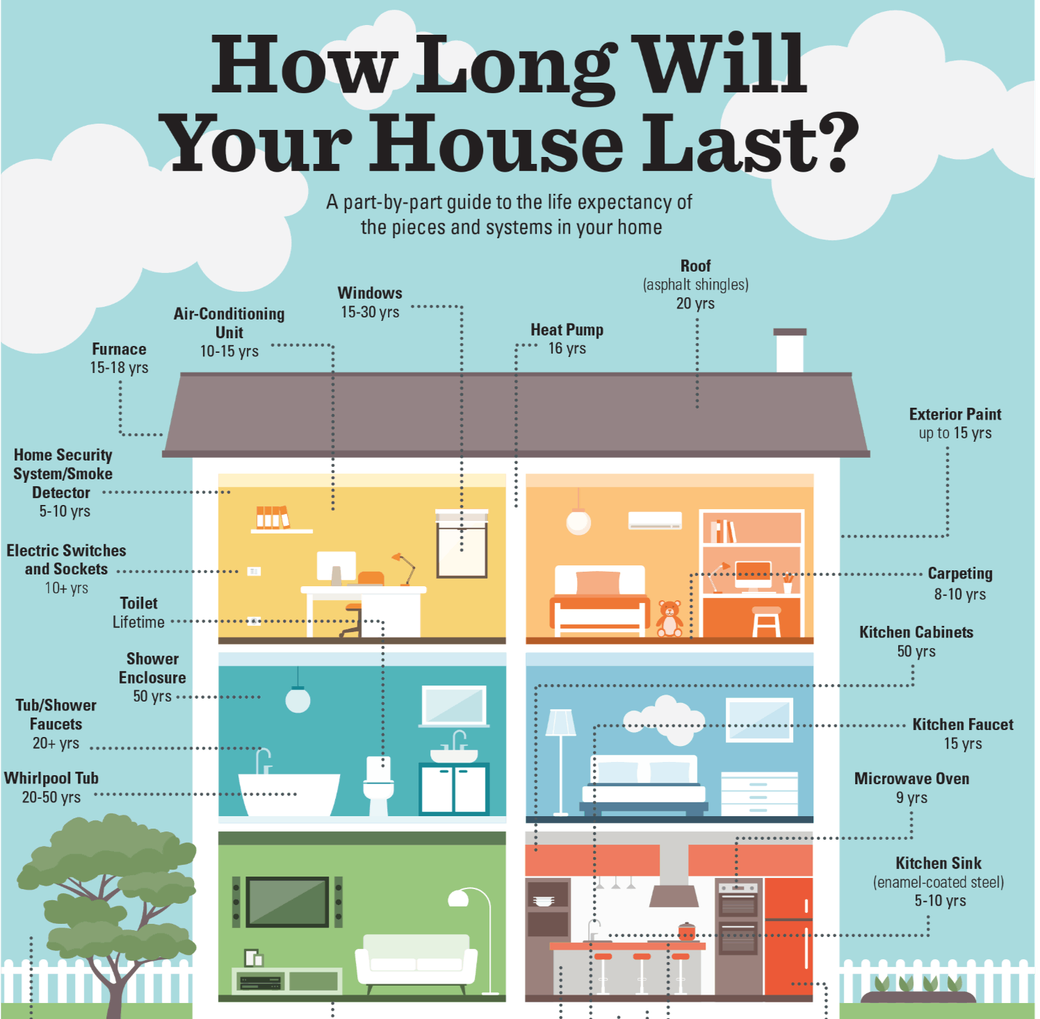Blog > How Long Will Your Home Last? A Part-by-Part Analysis of the Pieces and Systems in Your Home
How Long Will Your Home Last? A Part-by-Part Analysis of the Pieces and Systems in Your Home
by
How Long Will Your Home Last? A Part-by-Part Analysis of the Pieces and Systems in Your Home
When you invest in a home, it's not just about the style or location; it’s about longevity and understanding how long different parts and systems in your home will last. Regular maintenance and timely upgrades can extend the lifespan of your home’s components, but knowing the expected lifespan of each part is key for budgeting, planning, and ensuring that your home continues to be a comfortable and safe place to live.
Let’s break down the major parts and systems of your home, and how long you can expect each one to last.
1. Roof
Lifespan: 15-30 years (depending on material)
The roof is one of the most important components of your home, protecting everything inside from the elements. The lifespan depends on the material used:
-
Asphalt shingles: 15-20 years
-
Metal roofs: 40-70 years
-
Clay or concrete tiles: 50+ years
-
Wood shakes: 20-25 years
Regular inspections can prevent issues like leaks, which could shorten the life of your roof.
2. Foundation
Lifespan: 50-100+ years
The foundation of your home is designed to last for the life of the house, often outlasting most other components. However, settling or water damage can cause issues over time. Proper drainage and sealing are important for ensuring its durability.
3. Windows
Lifespan: 15-30 years
Quality windows can last decades, but wear and tear can affect their efficiency over time. Wooden frames may require more maintenance, while vinyl or fiberglass windows can last longer with less upkeep. If you notice drafts or condensation between panes, it might be time for a replacement.
4. Plumbing System
Lifespan: 40-70 years
The materials used in your plumbing system can greatly affect its lifespan:
-
Copper pipes: 50-70 years
-
PVC pipes: 25-40 years
-
Galvanized steel pipes: 20-50 years
Regular maintenance, such as checking for leaks or corrosion, can help prevent plumbing issues. Over time, mineral buildup and pipe degradation may require replacement.
5. Electrical System
Lifespan: 40-70 years
Like plumbing, the lifespan of your electrical system depends on the materials and components. The wiring and panels may last for decades, but outdated wiring and overloaded circuits can be a safety hazard. It’s crucial to have an electrician inspect your system every few years, especially if you’re adding new appliances.
6. HVAC System (Heating, Ventilation, and Air Conditioning)
Lifespan: 10-20 years
Your HVAC system works hard to keep your home comfortable year-round. On average, an HVAC system lasts 15-20 years, with regular maintenance extending its life. Replacing filters, scheduling annual tune-ups, and repairing any issues promptly can help prevent early failure.
7. Flooring
Lifespan: 10-50 years
Flooring comes in many materials, and the longevity depends on the type:
-
Hardwood floors: 30-100 years (with refinishing every 10 years)
-
Carpet: 5-15 years
-
Tile: 20-50 years
-
Vinyl or laminate: 10-30 years
Maintaining your floors, including regular cleaning and prompt repairs, can keep them looking and functioning well for longer.
8. Exterior Paint
Lifespan: 5-10 years
The exterior paint of your home is constantly exposed to the elements, meaning it will fade and peel over time. Typically, the lifespan of exterior paint is around 5-7 years, but in harsh climates, it may need to be touched up sooner. Proper prep work, such as cleaning and priming surfaces, can extend the paint's durability.
9. Insulation
Lifespan: 80-100 years
Proper insulation keeps your home energy-efficient and comfortable. Most insulation, particularly in the attic, can last a lifetime, although its effectiveness may decrease over time. Keep an eye on any signs of poor insulation, such as drafts or high energy bills, as it might be time to replace or add more.
10. Sewer System
Lifespan: 50-100 years
The sewer lines running from your home to the main line are built to last. However, issues like root intrusion, pipe cracks, or clogs can shorten their lifespan. It’s important to keep an eye out for slow drains, foul odors, or flooding, which can signal a need for repair or replacement.
11. Appliances
Lifespan: 5-20 years
Appliances have varied lifespans, and proper maintenance can extend their use:
-
Refrigerator: 10-20 years
-
Dishwasher: 9-10 years
-
Oven/stove: 10-15 years
-
Washing machine: 10-15 years
Clean filters, regular servicing, and prompt repairs can keep your appliances working well for longer periods.
12. Water Heater
Lifespan: 8-12 years
Water heaters typically last 8-12 years, but this can vary depending on the type (tankless vs. traditional) and how well it’s maintained. Regular flushing to remove sediment buildup and monitoring for leaks can extend the lifespan of your water heater.
Conclusion
Each part of your home has a specific lifespan, and understanding how long your home's components last can help you plan for future repairs, replacements, and maintenance. Regular upkeep, along with timely replacements, will ensure your home remains functional and comfortable for years to come. Whether you’re looking to buy or sell, knowing the expected lifespan of your home’s systems can provide peace of mind and allow you to make informed decisions.

